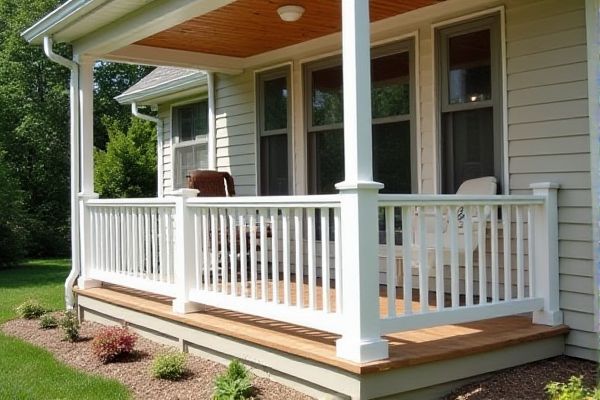
Horizontal slat railing offers a modern, sleek look with wider views and a more open feel, while vertical picket railing provides a traditional, classic appearance with enhanced safety and privacy. Explore the following details to determine which style best suits your porch and personal aesthetic.
Table of Comparison
| Feature | Horizontal Slat Railing | Vertical Picket Railing |
|---|---|---|
| Design Style | Modern, sleek, contemporary | Traditional, classic, timeless |
| Visual Impact | Creates a wider, open appearance | Provides a structured, orderly look |
| Privacy | Offers more partial privacy due to horizontal slats | Less privacy, open sight lines between pickets |
| Installation Complexity | Moderate; requires precise leveling of slats | Simple; standard pickets spaced evenly |
| Maintenance | Regular cleaning to prevent dirt buildup on horizontal surfaces | Easy; vertical pickets shed water and debris better |
| Safety | Horizontal slats may encourage climbing (not child-safe) | Vertical pickets are safer as they discourage climbing |
| Material Compatibility | Works well with wood, metal, composite | Compatible with wood, metal, vinyl |
| Cost | Typically higher due to design complexity | Usually lower as design is simpler |
| Building Code Considerations | May face restrictions in areas with strict safety codes | Generally compliant with most local building codes |
Introduction to Porch Railing Styles
Horizontal slat railing offers a modern, sleek look with wide, flat boards running parallel to the porch floor, creating an open and expansive feel while allowing better sightlines. Vertical picket railing provides a traditional, classic design with evenly spaced vertical posts, enhancing safety and privacy by minimizing gaps. Choosing between these styles depends on your porch's architectural style and your preference for either contemporary aesthetics or timeless charm.
What is a Horizontal Slat Railing?
A horizontal slat railing features evenly spaced horizontal boards or metal slats running parallel to the ground, creating a modern and sleek look for your porch. This design enhances visibility and openness while maintaining safety, often favored for contemporary architectural styles. Compared to vertical picket railings, horizontal slat railings provide a unique aesthetic that emphasizes clean lines and spatial flow, boosting your home's curb appeal.
What is a Vertical Picket Railing?
A vertical picket railing consists of evenly spaced, upright balusters or "pickets" that provide both safety and classic aesthetic appeal to your porch. This design enhances visibility through the railing while ensuring code-compliant gaps for security. Compared to horizontal slat railing, vertical picket railing offers a traditional look that complements various architectural styles and resists horizontal climbing risks.
Aesthetic Appeal: Modern vs. Traditional
Horizontal slat railing offers a sleek, modern aesthetic that enhances contemporary porch designs with clean lines and a minimalist feel. Vertical picket railing provides a classic, traditional look that complements vintage or colonial-style homes, evoking timeless charm. Your choice will significantly influence the porch's overall style, balancing modern sophistication against traditional warmth.
Privacy and Visibility Differences
Horizontal slat railings offer enhanced privacy by minimizing gaps, creating a more enclosed and discreet porch space, while vertical picket railings provide greater visibility and an open, airy feel due to wider spacing between pickets. You can choose horizontal slats to block sightlines and increase seclusion or opt for vertical pickets to maintain clear views of your surroundings. The choice depends on whether privacy or visual openness is your priority for your porch.
Safety Considerations and Building Codes
Horizontal slat railing can pose safety risks as it may encourage climbing, especially for children, which many building codes address by limiting gap sizes and height requirements. Vertical picket railing typically meets safety standards more easily by preventing footholds, reducing fall hazards, and complying with common code regulations such as spacing between balusters being no more than 4 inches apart. To ensure your porch railing meets local building codes and maximizes safety, verify specific regulations with local authorities before installation.
Maintenance and Durability
Horizontal slat railings typically require more frequent maintenance due to potential warping or sagging of slats, especially in harsh weather conditions, whereas vertical picket railings often offer greater structural stability and resilience. Vertical picket designs simplify cleaning and repainting processes because their upright posts allow for easier access and less debris accumulation. Choosing materials like pressure-treated wood or powder-coated aluminum enhances the durability of both railing types by resisting rot, rust, and UV damage.
Installation Process and Costs
Horizontal slat railings typically require precise measurements and secure fastening of wider, flat boards, often leading to a more complex installation process that may increase labor costs. Vertical picket railings feature more uniform, evenly spaced posts that are generally quicker and easier to install, reducing overall labor time and expenses. Material costs for horizontal railings can be higher due to the need for longer, sturdier boards, while vertical picket railings often use shorter balusters that are more cost-effective.
Which Railing is Best for Your Porch?
Horizontal slat railings offer a modern, sleek aesthetic and provide unobstructed views, making them ideal for contemporary porch designs focused on openness. Vertical picket railings provide classic charm, better security, and comply with many building codes requiring spacing to prevent falls, making them suitable for family-friendly spaces. Considering safety standards, style preference, and maintenance needs will help determine which railing type best suits your porch.
Conclusion: Making the Right Choice for Your Home
Horizontal slat railing offers a modern, sleek appearance that enhances your porch with a contemporary style, while vertical picket railing provides classic charm and traditional appeal. Your decision should consider factors such as aesthetic preference, safety needs--especially for homes with children or pets--and local building codes that often favor vertical pickets for spacing requirements. Evaluating these elements ensures you select the railing that best complements your home's design and functional demands.
 homyna.com
homyna.com